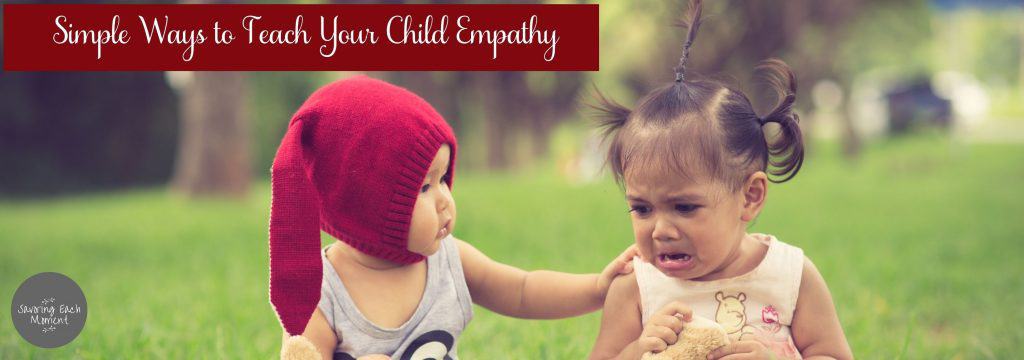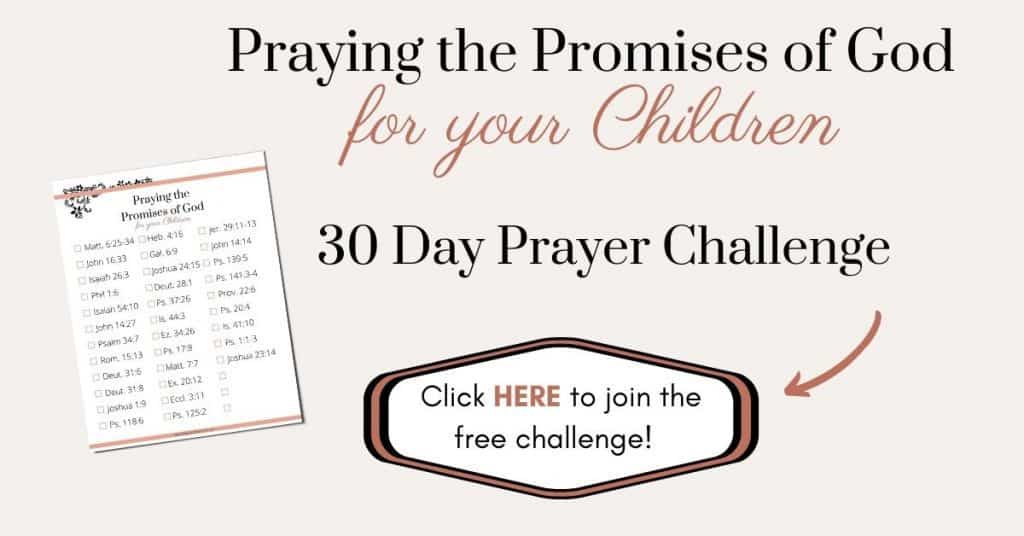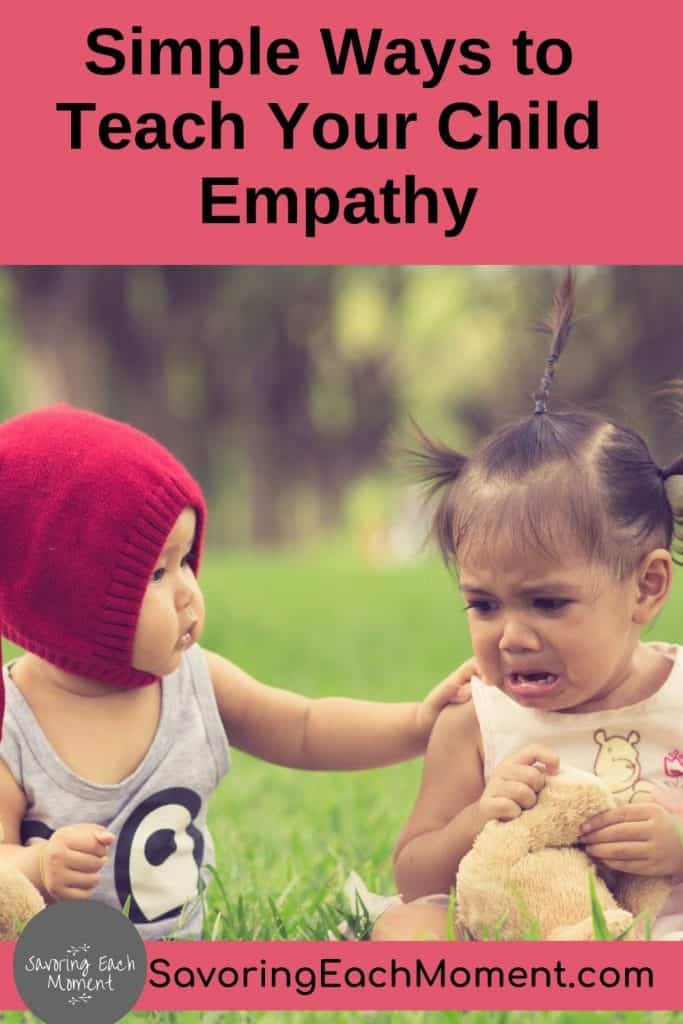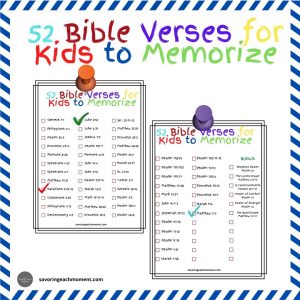It hurts our mama hearts when our children are sick or hurting, doesn’t it? It’s almost as though we can feel their pain and we hurt for them – sometimes even more than they hurt for themselves!
When our children are physically or emotionally hurt, we naturally feel a strong desire to protect and help them. But while empathy for our children comes naturally to most of us as parents, it doesn’t come naturally to our kids. We need to teach our children to have empathy!
Just like any other character quality we want our children to possess, we can’t just hope that they someday acquire it. We must take action while they are young to help them develop tender hearts that quickly feel empathy for others.
By teaching our children empathy, we are giving them a viewpoint on life that focuses on kindness and love for others.

This post may contain affiliate links. That simply means that I may receive a small commission when you purchase something through the link at no additional cost to you.
What is Empathy for Kids?
Empathy for kids means teaching them to think about others and consider how their actions affect other people. It’s the first step towards feeling and showing kindness, generosity, and love.
Children are naturally selfish – as we all are! Empathy is the perfect starting place to combat selfishness by teaching children to think about others before themselves.
What is Compassion for Kids?
Compassion is empathy in action.
Empathy enables a child to look at a friend who fell off their bike and feel sorry that their friend is in pain.
Compassion puts that caring feeling into action! It’s what motivates that child to help their friend up, get them a bandaid, or find an adult to take care of them.
Developing Empathy in Early Childhood
The earlier our kids develop empathy, the more it will become part of their character as they grow. Early childhood is the golden age of opportunity to help our children form habits of empathy and compassion for other people!
So how can you help your child develop empathy at a young age?
One of the most powerful tools for teaching empathy that I’ve learned is one that my mother-in-law taught me.
Ask your child how they think someone else feels in a certain situation. There are three specific questions you can ask your child to help them begin to develop empathy with other people.
- How do you think this person feels right now? (Use the person’s name if you know it.)
- Why do you think they feel that way?
- What could you do to help them feel better?
For example, let’s say your four-year-old grabbed a toy from his younger sibling and made them cry.
Get down on your child’s level and ask, “How do you think (siblings name) feels right now?” This helps the child to shift their perspective from how they feel to how their sibling is feeling.
Once your child answers, ask the follow-up, for example, “why do you think they feel sad?” This question helps your child realize that their action had a negative impact on their sibling.
End with the question, “What could you do to help them feel better?” The last question prompts compassion, which is empathy in action. Your child might be able to give their sibling a hug, apologize for taking the toy, and work out a system for sharing the toy.
These simple questions are a starting point to helping your child realize that other people feel things the same way they do. They set the stage to teach your child empathy.
Get this awesome printable list of Bible verses for your kids to start memorizing today! 📌
Activities to Teach Your Child Empathy
The three questions we just talked about work well in situations where your child has thoughtlessly hurt someone else, either physically or emotionally, but they can also be helpful in situations where your child had no active role.
For example, if a relative is sick, you could use these questions to help your child understand why you might have needed to cancel plans with them. You can always ask whatever other questions you want, too! You might ask your child how they feel when they’re sick, and what they might want someone to do for them.
Then you can put that empathy into action by making some soup to deliver, or sending them a get-well card.
There are also some simple activities you can do with your child to also help them develop empathy.
- Regularly ask your child how they are doing and encourage them to ask you as well. This helps to build recognition of different emotions and the ability to communicate them.
- Teach your children to ask themselves “what would I want if I was [insert person in question]?”
- Point out to your children when you see someone else showing empathy. This could be friends, family, or characters in books or tv shows. This helps children to recognize empathy easily.
- Praise your child when you see them showing empathy, even in small ways. Children thrive on praise!
RELATED: Simple Ways to Teach Your Child Kindness
Examples of Empathy from the Bible
Our first and most important example of empathy from the Bible is the example that Jesus set while he was on the earth.
A great place to start when teaching children empathy from the Bible is with the Golden Rule, which is usually summarized in the words “Do unto others as you would have others do to you.”
The ESV version says, “So whatever you wish that others would do to you, do also to them, for this is the Law and the Prophets.” ~ Matthew 7:12, ESV
Jesus showed empathy in so many different ways! Here are just a few examples.
- When he shed tears at Lazarus’ tomb (John 11:33-35, ESV)
- When he raised the ruler’s daughter from the dead and healed the sick woman (Matthew 9: 18-25, ESV)
- When he fed the five thousand people with loaves and bread (Matthew 11:16-21, ESV)
- When Jesus wept over Jerusalem (Luke 19:41-44, ESV)

Examples of Compassion from the Bible
Jesus is again our biggest example of compassion in the Bible as well! Of course, the most significant and sacrificial act of compassion was Jesus dying on the cross to pay the penalty for our sins.
God’s compassion for his children was so overwhelming that he took all our punishment upon himself, rather than watch us suffer for eternity. What an incredible Savior!
“Surely he has borne our griefs and carried our sorrows; yet we esteemed him stricken, smitten by God, and afflicted. But he was pierced for our transgressions; he was crushed for our iniquities; upon him was the chastisement that brought us peace, and with his wounds, we are healed. All we like sheep have gone astray; and we have turned – everyone – to his own way; and the Lord has laid on him the iniquity of us all.” ~ Isaiah 53:4-6, ESV
Here are a few more examples of compassion from the Bible.
- Jesus had compassion on the crowds and healed the sick. (Matthew 11:14)
- Joseph had compassion on his brothers when they came to him for food. (Genesis 45:4-7)
- Rebecca had compassion on Eleazer when she watered his camels. (Genesis 24:18-20)
- God had compassion on the children of Israel when they were thirsty in the desert. (Exodus 17:3-6)
RELATED: Simple Ways to Teach Your Child to Be Respectful

Final Thoughts to Teach Your Child Empathy
Empathy is a powerful emotion that combats the selfishness inherent in each one of us. Compassion is the blossoming fruit that empathy yields.
If you’re wondering how to teach your child to have empathy, I encourage you to start by asking the three questions when appropriate.
- How your child thinks someone else feels.
- Why your child thinks they feel that way.
- What your child can do to help.
These three questions not only foster the skill of empathy, but they are also simple ways to encourage your child to be compassionate.
You might also want to go through some examples of empathy and compassion from the Bible with your child.
Teaching your child empathy doesn’t have to be a daunting task! These simple tools can help you lay the groundwork with your child to grow empathy and compassion that will serve them well their entire lives.
RELATED: The Most Important Things to Do When Your Family is Sick

Hi, I’m Lieren! I’m a Jesus-loving girl living my childhood dream as wife to my best friend and mommy to our three children. I blog at Motherhood Beyond Survival, where I share practical advice, ideas, and encouragement to help moms move from merely surviving motherhood to truly thriving in it. My favorite things include getting lost in a good book, singing in the car, spontaneous adventures, and anything chocolate.
You may also like these Biblical parenting links…
- Tips for Sitting in Church with Kids
- Bedtime Prayers – Creating an Evening Routine
- 52 Memory Verses for Kids to Memorize
- Family Worship Ideas with Kids
- Morning Prayers for Families
- Teaching Kids to Pray
- 9 Powerful Prayers for Your Daughter
❣ Sign up to get our weekly email filled with encouragement, ideas, and support for moms raising kids who love Jesus! ❣


